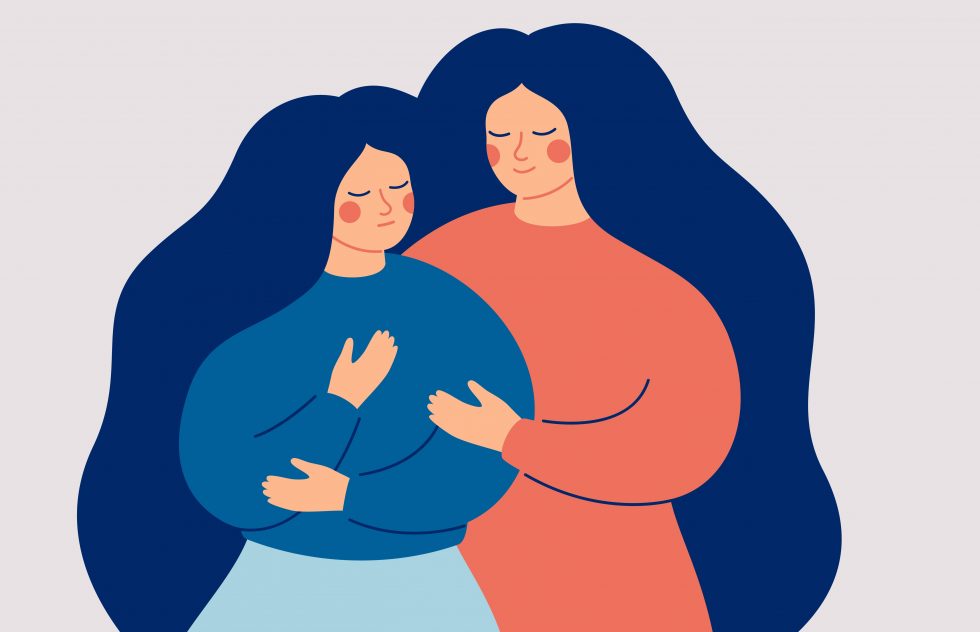Supporting Loved Ones Who Are Struggling With Depression
Written by: Mollie Clupper, Public Ally for the Mental Health Association in Delaware
I am sure it’s hard to watch someone you love struggle with depression. Watch them pull away and isolate themselves. Listen to their unexplained, angry outbursts or complaints of exhaustion.
As someone who struggles with depression and anxiety, I have experienced all of these symptoms. So, while it might be difficult to watch, it is incredibly difficult to experience firsthand. I was once told by a family member that “it’s hard for them to understand” because they “can’t relate” or they “have never experienced mental health issues.”
First of all, that’s great! I wouldn’t wish what I experience on my worst enemy. Second of all, it is not for you to understand. People who struggle with depression often do not want your understanding, pity, or sympathy. It is not helpful to say “I understand what you are going through”, when you don’t.
Now, this isn’t to be critical, of anyone. And some people might want your understanding and acknowledgement. However, there are better ways to support those with depression. Here are some examples of what not to say in these situations and followed by more appropriate responses to use, instead.

Be Careful with Words
Have you ever heard of the man who told his wife “you need to calm down”, and then all was well? Yeah, me neither. The same goes with those who are struggling with depression, or other mental health issues. Avoid telling someone they need to simply calm down or they are “just being dramatic.” This can dismiss their symptoms, deny what they are feeling, and can be a bit insulting.
Instead, try using a phrase such as “I may not know exactly how you feel, but I’m here for you.” You don’t have to understand how the person feels in order to support them.
Don’t Blame or Shame
Avoid telling someone it is “their fault” that they are feeling depressed, or that it is all in their head. In fact, depression is not just a mental health disorder, but can often present many physical symptoms, as well. Some include “body aches, nausea, insomnia, fatigue, high blood pressure, and weight changes” (Schimelpfening, 2020).
It is also important not to shame someone for how they are feeling. People are often told that they are selfish and that “other people have it a lot worse.” It’s true, that there is always going to be someone who has it worse than you do. However, implying that someone is selfish and does not care for others, especially in the midst of a depressive episode, can be very harmful and fuel feelings of blame or guilt.
Instead, validate what the person is feeling by saying something such as “depression is a real health issue and should not be ignored.”
Don’t Dismiss the Pain
Just because you can’t see someone struggling, doesn’t mean they aren’t. It’s important not to dismiss how someone is feeling just because “they don’t look depressed.” Many people struggling with depression, and other mental health disorders, might hide it or put on a good face.
“People who need help, sometimes look a lot people who don’t need help.”-Glennon Doyle
So, what can you do about it? First, you don’t have to do anything. Just listen. Listening skills are an underrated asset, in many situations. It’s also important to listen without trying to “fix” anything.
It might also be a good idea to educate yourself on what they are going through. That being said, not everyone experiences depression the same, nor it is it your job to play therapist. Instead, maybe research actual therapists and other, outside support systems. Have it your disposal and offer it, when your loved one comes asking for help and input.
Finally, while unsolicited advice is not usually helpful, it IS important to speak up if you believe your loved one is at risk for self-harm. Know the resources and who to call for help, and don’t just ignore it. It is okay to share concern for your loved ones, even if it is just to say you are there for them when they need it.
How to Get Help
If you or someone you know is experiencing depression, call the National Suicide Prevention Hotline number at 800-273-TALK (8285).
You can also call the Delaware Hope Line: (833) 9-HOPEDE, or (833) 946-7333
JFS Delaware is here to help you or a loved one on your mental health journey. Get started today by completing our online intake form.
For more support resources, make sure to also check out Mental Health Association’s Wellness Groups.
Meet Our Guest Blogger:
 Mollie Clupper is working as a Public Ally AmeriCorps Apprentice for the Mental Health Association in Delaware. Using her own experiences, she wants to help bring awareness and end the stigma surrounding mental health. In her spare time, she enjoys hiking, drinking coffee, and spending time with her fur-niece.
Mollie Clupper is working as a Public Ally AmeriCorps Apprentice for the Mental Health Association in Delaware. Using her own experiences, she wants to help bring awareness and end the stigma surrounding mental health. In her spare time, she enjoys hiking, drinking coffee, and spending time with her fur-niece.
About MHA:
The Mental Health Association in Delaware (MHA) promotes improved mental well-being for individuals and families in Delaware through education, support and advocacy. MHA believes that every person, regardless of disability, race, ethnicity, gender, age, economic status, or sexual orientation, has the right to be treated with compassion and respect.
References:
Schimelpfening, N. (2020). The Physical Side Effects of Depression. Retrieved on 1/20/21 from https://www.verywellmind.com/physical-effects-of-depression-1066890

